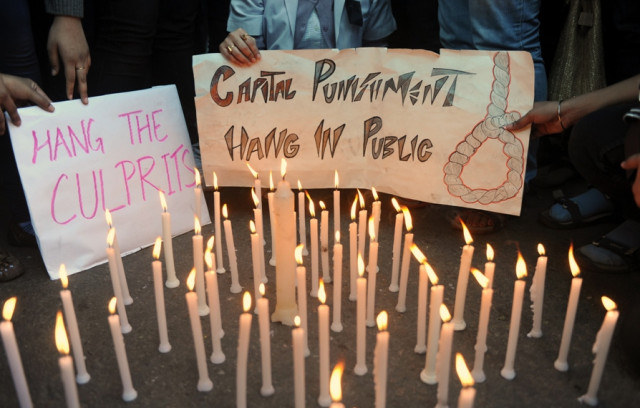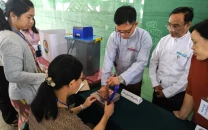Court lifts media ban on Delhi gang-rape trial: lawyer
The case has led to months of soul-searching over endemic sex crime.

Indian students and activists carry placards in protest over the gang rape in India. PHOTO: AFP/FILE
The case has led to months of soul-searching over endemic sex crime, resulted in new tougher laws to punish rapists and focused global attention on violence against women in India.
Amid conflicting reports about the ruling, Meenakshi Lekhi, a Supreme Court lawyer who filed the plea to overturn the ban in the Delhi High Court, explained that access would be limited and come with safeguards.
"The Delhi High Court has allowed one person from a national TV channel and one person from a national news agency or print media to cover the proceedings," the lawyer said in a phone interview.
Restrictions include not naming the student or her family -- in accordance with existing Indian law that protects the identity of rape victims -- and not naming witnesses who are being offered protection.
The Press Trust of India news agency quoted the presiding judge as saying that "one representative journalist of each of the accredited national dailies" as well (as) domestic news agencies would be allowed in.
Dayan Krishnan, the special prosecutor in the gang-rape case who had opposed the plea in court, told AFP that only one reporter would be allowed in, but admitted he had not yet read the full judgement.
"We are fine with (the judgement)... because of the safeguards," he said.
Lawyer Lekhi called the ruling "a very balanced judgement", adding: "It balances the right of the media to report with the right to protection for the victim, her family and the witnesses."
Five men and a juvenile were arrested shortly after the crime and were charged with gang-rape, robbery and murder following the death of the 23-year-old victim, who succumbed to horrific internal injuries.
One of the suspects, the alleged ringleader and driver of the bus used in the assault, died on March 11 after he was found hanging in Tihar Jail in a major embarrassment for prison authorities.
The trial, in a special fast-track court in the south of the capital, has been underway since January with the media restricted to reporting occasional comments from lawyers involved in the case outside the court room.
The December 16 gang-rape of the student led to sometimes violent protests in India and brought simmering anger among women about rising rape and harassment to the boil.
The victim was returning home from the cinema with a male friend when she boarded a private bus, according to her and police statements.
Once inside, a gang of six men beat up her friend and took turns in sexually assaulting her, inflicting fatal internal injuries with an iron bar before dumping them by a road on the way to Delhi's international airport.
India's parliament cleared new legislation on Thursday that provides for a minimum 20-year prison sentence for gang-rape, which can be extended to life in jail.
The gang-rape of a Swiss cyclist last Friday again highlighted the dangers facing women in India while a British woman suffered leg injuries earlier this week as she escaped her hotel over fears of a sex attack by the manager.



















COMMENTS
Comments are moderated and generally will be posted if they are on-topic and not abusive.
For more information, please see our Comments FAQ